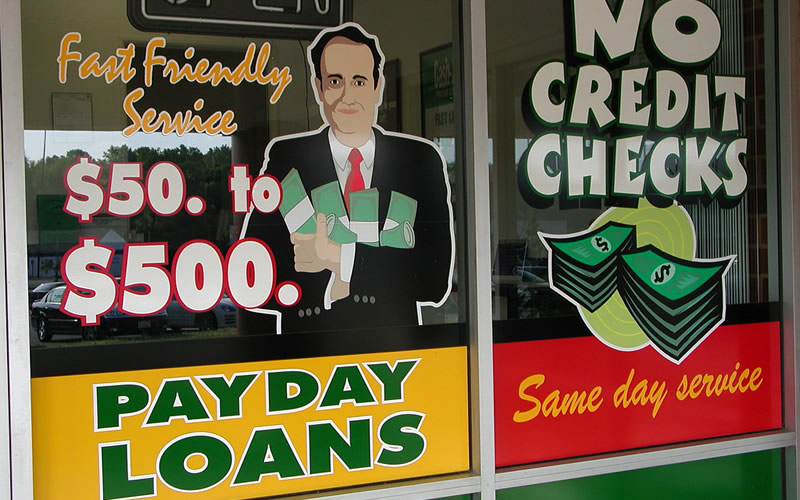
By Lindsay Street, Statehouse correspondent | Nearly a quarter billion dollars in fees were levied against some of the state’s lowest income earners in 2018 as they took out high-interest loans of less than $1,000, according to a new report.
In April, the Center for Responsible Lending issued a state-by-state look at fees generated from short-term, low amount loans that can charge triple digit interest rates borrowed against a car title or a future paycheck. South Carolina is 12th in the nation in the amount of fees: $57.8 million in payday loan fees and $187.3 million in car title loan fees.
The average income of those taking out the loans is $25,000 per year, report author Diane Standaert told Statehouse Report. In South Carolina, low-income earner advocate Sue Berkowitz said payday and car title lenders “target” poor and minority communities.

“There’s absolutely no question there is a lot of money going from low-income communities into the coffers of these companies,” said Berkowitz, executive director of S.C. Appleseed Legal Justice Center said. A year ago, the agency mapped where car title lenders and payday lenders had locations, which were often found in low-income communities and communities of color.
- Read S.C. Appleseed’s brochure on car title lending in South Carolina. Most title loans are between $601 and $2,500, it says. If a loan is taken out for $601 at a 25 percent interest rate and $150 is paid monthly, the borrower will consistently owe $750 every month, according to the group.
In a statement, payday lender Advance America said it provides a service to people who need access to capital through borrowing.
“Restrictions would do nothing to address South Carolinians’ very real financial needs. Their need for credit would not disappear, just this regulated borrowing option would,” a company representative wrote in a statement. The statement referred to its borrowers as “hardworking families.”
States are the ‘battleground’
According to Standaert, federal level regulation on these high-interest loans remains sparse, especially in recent years. During the Obama administration, rules were established for lenders to assess borrowers’ ability to repay the high-interest loans. The rules were set to go into effect August 2019, but now they have been delayed until at least November 2020. Former GOP S.C. Congressman Mick Mulvaney helped delay the rules when he led the Consumer Financial Protection Bureau, and U.S. Sen. Lindsey Graham, R-S.C., has filed legislation that would repeal those still-unrealized protections, Standaert said.
She called the federal actions “a big gift to the payday and car title lenders,” adding it was up to state policy on how much money is “drained” from low-income communities.
“States have long been the battleground for consumer protection on these issues. They are positioned to take action,” Standaert said. “It’s a matter of what the state legislature says is acceptable.”
South Carolina is one of 34 states that allow lenders to charge triple-digit rates. According to the report, 16 states and the District of Columbia have interest rate caps of about 36 percent annual percentage rate (APR). Federally, lenders are not allowed to charge military families more than 36 percent interest.
In South Carolina, payday and car title lending regulation falls under the S.C. Department of Consumer Affairs, which also regulates pawn shops. The two lending types are regulated differently, according to department administrator Carrie Grube-Lybarker.
In the last 20 years, two pieces of legislation passed the General Assembly and “tightened” regulations on the lending practices, she said.
In 2004, lawmakers passed a law that restricted accruing interest on car title loans. It also created a loophole: only limiting the regulation of car title loans repaid in fewer than 120 days. Grube-Lybarker said some companies chose to make loan repayments at 121 days in response. There are no caps on car title loans in the state, and Grube-Lybarker said some have up to 750 percent APR. Any rate above 18 percent must be reported to the agency.
At 750 percent APR on a $1,000 loan, a borrower would pay $7,500 just for the interest on the loan, according to a calculation by S.C. Appleseed. The monthly payment would be more than $700 a month.
“We can bring a lawsuit and ask a judge to (deem rates unconscionable),” Grube-Lybarker said. But, she said, that has not happened in the recent past.
A call to a lobbyist representing TitleMax in Columbia went unreturned.
In 2009, the state also tightened payday lending. Borrowers were entered into a database, and lenders needed to check eligibility of borrowers. Those with outstanding loans or with eight loans in one year are to be denied a new loan under the law.
The year that the new law was passed, more than 4 million payday loans were reported in the state — that’s nearly one for every person residing in the state that year. Grube-Lybarker said the following year, the number of payday loans saw “a dramatic decrease” to about 1 million.
In the statement to Statehouse Report, Advance America said the “current South Carolina laws provide a sound regulatory framework that protects consumers from bad actors while preserving essential access to credit.”
The lender warned against caps, saying states enacting caps “leave consumers with little choice but to turn to the costlier, riskier or unregulated alternatives that flourish in the absence of regulated options.”
For a $500 loan through Advance America in Eastover, a $75.50 charge is levied for the 14-day period, according to the company’s online calculator. The rate works out to just under 400 percent APR. See their calculator here.
Advance America has donated to Republicans and Democrats in the state legislature and mayoral campaigns in the state, according to S.C. Ethics Commission records.
What’s being done in Columbia
The General Assembly doesn’t appear hungry for more regulation of the industries, though a smattering of legislation was filed this session.
S.C. Sen. Gerald Malloy, D-Darlington, filed two bills this session: S. 63, which would cap interest rates for car title loans, and S. 56, which seeks to make it illegal to loan money against a paycheck. There were two similar bills filed in the House by S.C. Rep. Ivory Thigpen, D-Richland.
“We have to make certain that we do things that make economic sense rather than what would be characterized as usery,” Malloy told Statehouse Report. He said neither bill, both stalled in committee and without any other cosponsors, have been prioritized by his peers.
Grube-Lybarker said her agency has not made any recommendation to cap interest rates at this time, and there are no plans to do so in the immediate future. However, the agency is looking at how it restricts and regulates types of lending in the state.
“It would be a major revamp of statutes since 1982,” Grube-Lybarker said. She said it will be “well-thought out and vetted” with all parties to the table. A timeline for when that process could begin was not available. She said 2020 was likely too soon.
Malloy said it’s not too late for legislators to take action beginning in January.
“There would be some interest if we started pushing it for discussion,” he said. “We (have) got to watch what happens with the Feds and we got to at least try to emulate what they do with our armed services.”
- Have a comment? Send to: feedback@statehousereport.com















 We Can Do Better, South Carolina!
We Can Do Better, South Carolina!